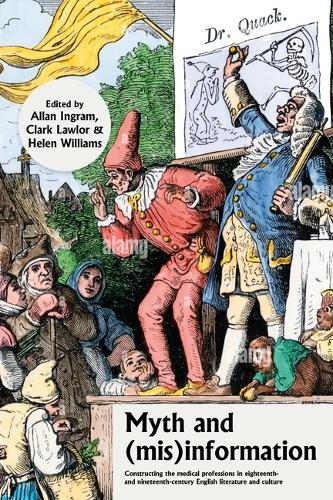
Myth and (Mis)Information: Constructing the Medical Professions in Eighteenth- and Nineteenth-Century English Literature and Culture
(Paperback)
Available Formats
Publishing Details
Myth and (Mis)Information: Constructing the Medical Professions in Eighteenth- and Nineteenth-Century English Literature and Culture
By (Author) Allan Ingram
Edited by Helen Williams
Edited by Clark Lawlor
Manchester University Press
Manchester University Press
29th April 2026
United Kingdom
Classifications
General
Non Fiction
Literature: history and criticism
Essays
820.93561
Physical Properties
Paperback
312
Width 156mm, Height 234mm
Description
This collection draws together original scholarship from international contributors on a range of aspects of professional and semi-professional medical work and its relations to British culture. It combines a diverse spectrum of scholarly approaches, from medical history to book history, exploring literary and scientific texts, such as satiric poetry, essays, anatomies, advertisements, and the novel, to shed light on the mythologisation and transmission of medical (mis)information through literature and popular culture. It analyses the persuasive and sometimes deceptive means by which myths, as well as information and beliefs, about medicine and the medical professions proliferated in English literary culture of this period, from early eighteenth-century household remedies to the late nineteenth-century concerns with vaccination that are still relevant today.
Reviews
Studies of the connections between literature and medicine of the eighteenth and nineteenth centuries have increased in number over the past few years but rarely do we see such in-depth studies of the lexical and textual mechanics of this intersection. The stimulating essays of Myth and (mis)information remind us that important debates about truth, meaning, and representation go to the heart of the social and global history of medicine and that if we are to understand the present, we must first take an interdisciplinary, collaborative approach to the languages of the past.
Professor Andrew Mangham, University of Reading
Myth and (mis)information is a must read for anyone in search of new insights into the modern medical marketplace, the circulation of knowledge, reader-reception of medical texts, and the shaping of medical culture. In a post-COVID era, it skilfully historicises the current anxieties we have about health misinformation. The book encompasses multiple aspects of medical writings within a cultural and historical perspective: women publishers, herbalists and healers, overlooked texts by medical celebrities, dog doctors, illness narratives of poxed men, medical branding and advertising, medical controversies on epidemics, vaccination or anatomy. A rattling good read!
Sophie Vasset, Institut de Recherches sur la Renaissance, l'ge Classique et les Lumires (IRCL), Universit de Montpellier Paul-Valry
Author Bio
Allan Ingram is Emeritus Professor of English at the University of Northumbria
Clark Lawlor is Professor of Eighteenth-Century Literature at the University of Northumbria
Helen Williams is Associate Professor of English Literature at the University of Northumbria
